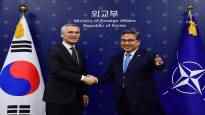NATO Secretary General Jens Stoltenberg asks Japan and South Korea for direct military aid to Ukraine. ‘s Asian correspondent Kirsi Crowley writes that a few years ago the request would not even have been possible.
BEIJING Secretary General of NATO Jens Stoltenberg flew to South Korea and Japan to promote the position of the military alliance in China’s neighborhood. In the neighboring countries of the Eastern superpower, security policy is a sensitive matter.
When the Secretary General of NATO pressures these countries to offer ammunition to Ukraine, he asks them for a complete turnaround in security policy.
Both South Korea and Japan have traditionally pursued a cautious defense policy. South Korean law prohibits arms exports to countries in active conflict. However, it has recently sold billions of euros worth of tanks and other equipment to, for example, Poland, which has then been able to send its own to Ukraine.
Since its disastrous defeat in the Second World War, Japan has pursued a peaceful security policy, as mandated by the constitution, according to which its forces act only in self-defense.
Both countries are currently rethinking their positions, as the threat seems to be growing. Japan decided last year to double its security spending over the next five years. Defense spending would rise to two percent of the budget, i.e. to the level recommended by NATO. In addition, for the first time, the Japanese armed forces have the right to make a proactive counterattack against an enemy target. Japan plans to buy, among other things, cruise missiles from the United States.
North Korea’s continuous missile tests and China’s bombing in nearby areas are the number one reasons for the desire to boost the defense. Stoltenberg also reminds the countries of these threats and the need for cooperation. In October, a North Korean ballistic missile flew over Japanese airspace.
Russia’s attack on Ukraine has strengthened the will to form a stronger alliance with the West. In Japan, public opinion has also turned to a more active security policy.
Japan and South Korea have provided aid to Ukraine, but so far no arms.
Stoltenberg said in Seoul that tyranny can only be prevented by sending weapons to Ukraine. He reminded that there are countries in Europe that have previously refused to send weapons to conflict areas, but now they have changed their line.
However, South Korea and Japan have to live next to their big neighbor. China considers NATO’s expansion intentions as the reason for Russia’s attack on Ukraine. For China, the expansion of NATO means an increase in the influence of its rival, the United States, and thus an increase in tension. From China’s point of view, direct arms aid to Ukraine from South Korea and Japan could look like an even deeper NATO footprint in Asia.
China has started that NATO is already in its backyard through the security cooperation Quad alliance. It includes Japan, India, the United States and Australia. Former Foreign Minister of China Wang Yi said it as Asian Nato.
General of the United States Air Force Michael A. Minihan stunned this week by bluntly predicting that the US and China could end up at war in 2025, the year after US-Taiwanese presidential elections.
Then the war would at least be close to South Korea and Japan as well. By supporting the war in Ukraine, they show their neighbors whose side they stand on in a conflict situation.
